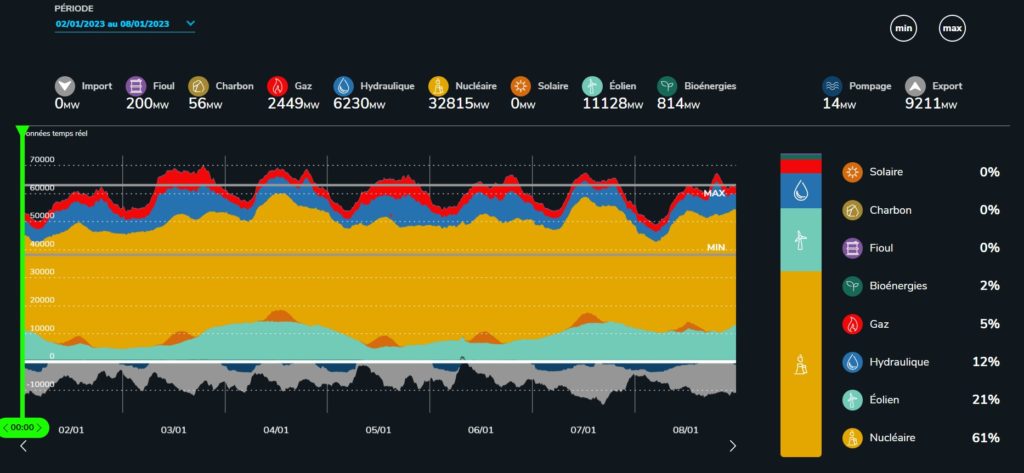Original article (in Serbian) was published on 11/01/2023
For months, domestic propagandists have been using the energy crisis in Europe to convince citizens that practically nowhere is like in Serbia – in the EU, energy prices rise and prices jump, while in our country everything is under control. One of the freshest examples of a propaganda program was seen by viewers on January 10 on TV Pink, when host Irina Vukotic hosted Informer editor Dragan J. Vucicevic, and the insert from this guest appearance caused ridicule on Twitter. Anyone who has been informed about the situation in the EU through this show probably thinks that Slovenia is in complete darkness, like France, where people are walking around with flashlights en masse, while in Germany they are keeping themselves warm in shopping centers. In Serbia, on the other hand, as the two agreed, the situation is “incomparable”.
The fact that the situation with energy sources in the whole of Europe is not good – due to the reduced flow of gas from Russia and the increase in prices – does not mean that there is milk and honey in Serbia, although this is exactly how some people try to portray things.
What was manipulatively said in this insert that was found on Twitter?
NO COMMENT pic.twitter.com/Vbq2Ofg4iN
— BABE-BAhati BEograđani (@BaOgra) January 10, 2023
“For example, France, where everyone buys flashlights, regen… God, means for heating, restrictions are announced”, the presenter began.
“They buy generators. They make electricity from oil to heat themselves”, Vucicevic corrected.
The story about France in the dark, where people buy flashlights and generators en masse, was published the day before this show by Vecernje Novosti, which refers to the Russian state agency RIA Novosti.
In the previous months, there was concern in France that the country would be faced with electricity restrictions in January this year. Electricity production from nuclear power plants, as France24 wrote at the beginning of December, was at a historic low because almost half of the 56 nuclear reactors were closed due to regular maintenance or problems with functioning. In December, President Emmanuel Macron appealed to citizens not to panic because only ten percent lower consumption could help to avoid restrictions, and RTE (the French public company for the supply of electricity) stated that they would “use” before the disconnection. other energy sources available, such as gas and fuel oil.
France, by the way, when it comes to energy sources, is not primarily dependent on Russia – the site of French radio RFI wrote in September that Russian gas makes up 17 percent of the total energy resources of this country, which relies mostly on its own production. Namely, there are 56 nuclear reactors in France that produce more than two-thirds of the total electricity. The remaining third, apart from gas, is made up of renewable energy sources such as wind.

In the first week of January, wind energy in France also provided a larger amount of electricity due to favourable weather conditions. As the French media reported yesterday, referring to the AFP agency, RTE confirmed that France has started exporting electricity to its neighbours again since January of this year.
Despite Pink’s claims that people there are buying flashlights and “regenerators” to survive the restrictions, this country has, at least temporarily, become an electricity exporter again thanks to the connection of nuclear reactors that were shut down in the previous period, as well as the wind and mild winter.
Trying to prove that the situation is chaotic everywhere except in Serbia, Vucicevic also cited the example of Slovenia, where, as he says, he recently travelled to see that “almost all the street lights were turned off” while passing through Ljubljana, as well as illuminated ads in shops.
We cannot know exactly what Vucicevic saw, but the Municipality of Ljubljana did adopt certain measures to save electricity. As announced by the municipality in November, the lighting in the parking lots and around the cultural and historical buildings, the intensity of the lights on the streets, and the decorative lighting were reduced in the city. Also, private businesses were recommended to turn off illuminated advertisements or to reduce lighting, and citizens to use lights in buildings economically, as well as heating in apartments.
Last year, at the national level, Slovenia also adopted recommendations for saving electricity in the public sector, such as those that in public buildings, rooms should not be cooled below 25 degrees and should not be heated to more than 20 degrees during the heating season.
The fact is, however, that similar recommendations for savings exist in Serbia as well, because Serbia is also facing an energy crisis even though Dragan Vucicevic and the host Irina Vukotic keep it quiet.
Last year, the Ministry of Energy of the Republic of Serbia appealed to citizens to save electricity in households, with detailed instructions from when to turn on the washing machine to the adequate temperature of the refrigerator. At the same time, public companies, local governments and others were asked to make plans on how they can save electricity due to the current crisis. Cities and municipalities were recommended to reduce public lighting on the streets by a third, as well as illuminated advertisements and billboards, to reduce and limit New Year’s lighting, and to switch to LED lighting wherever possible.
The recommendations are non-binding, but some have adopted them. For example, as Juzne vesti wrote, in certain streets of Nis it is even darker than in Ljubljana, but Vucicevic apparently did not go there. In this city, due to austerity measures, the New Year’s lights were also reduced, so at the end of last year, the city was generally less illuminated than usual. A similar situation existed in Subotica, where a third of the public lighting was turned off in October.
Vucicevic also said that “the price of electricity in Slovenia is incomparably higher than in Serbia”.
The price of electricity in Serbia is among the lowest in Europe – according to Eurostat data for the first half of last year, electricity in Serbia cost 0.08 euros per kilowatt hour, and it was cheaper only in Bosnia and Herzegovina, Georgia and Kosovo. In Slovenia, the cost is 0.1 euro, and the most expensive were the Danes who paid 0.45 euro per kilowatt hour.

On the other hand, due to the energy crisis, which no one is spared, the price of electricity is rising everywhere, even in Serbia – starting this month, electricity bills will be increased by eight percent.
Vucicevic also pointed out that he recently watched a program by Deutsche Welle on RTS in which a citizen of Berlin said that every day he comes to the shopping centre with his family to warm up in order to save electricity at home. This was supposed to serve as an illustration of the catastrophic situation in this country of Western Europe, in contrast to the situation at home.
Germany is very dependent on Russian gas – more than half of the gas consumed in Germany came from Russia. Due to the current war and sanctions against Russia, Germany is faced with the necessity to save energy: as Deutsche Welle wrote in September, energy prices are rising, and the state has issued a series of recommendations to save electricity.
However, the fact that the situation in Germany is difficult does not mean that it is not difficult in Serbia, even though Vucicevic suggests the opposite. As Raskrikavanje already wrote, since the beginning of the war in Ukraine, domestic pro-regime media have tended to report on economic problems in Europe, while at the same time presenting the situation in Serbia as solid or even excellent, thanks to Vucic’s policies.
They incorrectly wrote that in Switzerland it is forbidden for people to heat their apartments to more than 19 degrees, that the European Commission asks EU citizens not to drive cars, that the French are allowed to shower once a week and that the shops in Croatia are empty, and the companies are facing bankruptcy. Croatia is a special “inspiration” for the domestic media, which manipulatively report on the high rate of inflation, i.e. the rise in prices in this neighbouring country, ignoring the even more difficult situation in Serbia, which, at the same time, has a significantly lower standard (consumer basket, gross domestic product) than the countries that the pro-regime web portals report.



